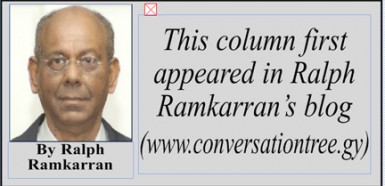The results of the local government elections should give no political comfort to our political parties. The PPP won 48 out of 71 NDC elections, similar to 1994 when it won 48 out of 65 and 28,000 more votes than the APNU+AFC. The APNU+AFC won 5 municipalities, the PPP 3 and 1 is a tie. The turnout at the local government elections was low, at least lower than the national elections, as occurs almost everywhere, and it is therefore unsafe to make any enduring political conclusions from the results. But some glaring issues have emerged.
 In the 1994 local government elections for the George-town municipality the PPP/Civic won 8 of the 30 seats. The GGG (Good and Green Guyana) won 12 and the PNC 10, a total of 22. In these elections the PPP won only 2 seats. There was a suggestion that the result was a consequence of the PPP/C government’s abandonment of the city. While this may have played a role, these types of failures have only a marginal impact on our rigid ethnic voting patterns. The PNC’s 40 per cent of the vote at the 1992 elections when every political indicator suggested that it should have been wiped out proves the point.
In the 1994 local government elections for the George-town municipality the PPP/Civic won 8 of the 30 seats. The GGG (Good and Green Guyana) won 12 and the PNC 10, a total of 22. In these elections the PPP won only 2 seats. There was a suggestion that the result was a consequence of the PPP/C government’s abandonment of the city. While this may have played a role, these types of failures have only a marginal impact on our rigid ethnic voting patterns. The PNC’s 40 per cent of the vote at the 1992 elections when every political indicator suggested that it should have been wiped out proves the point.
But experiences have shown that the ‘rigid ethnic voting patterns’ can be modified, especially when some disgruntled party supporters are swayed by what they see as a credible third force. In 1961 and 1964 a section of the Indian business and middle class abandoned the PPP and voted for the United Force. In 2006 a sizeable section of the African middle and working class abandoned the PNCR and supported the newly formed AFC. In 2011 and 2015, sections of the
